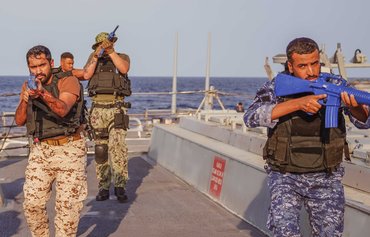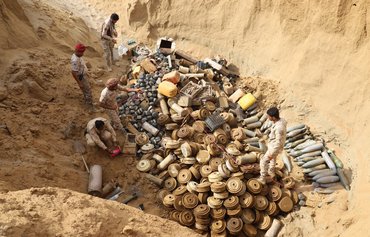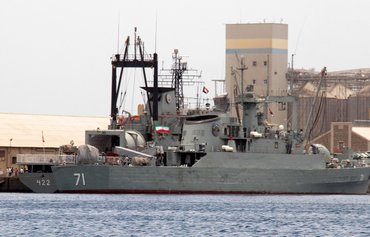ADEN -- Yemeni government officials are calling on the international community to take fresh measures to curb the smuggling of Iranian arms to the Houthis via regional waters following a recent incident involving the Sudanese navy.
The Sudanese Ministry of Defence on September 24 announced that its naval forces had seized a suspicious vessel in the Red Sea that was found to be loaded with weapons and explosives.
The vessel, crewed by four Yemeni nationals, was spotted inside Sudan's territorial waters near al-Sabaat Islands, the ministry said.
Its cargo was found to contain 90 Kalashnikov rifles, 162 boxes of machine gun bullets, 182 boxes of bullets and assorted ammunition, 43 boxes of explosive wires and 45 detonators, the ministry said.
![A general view shows docked ships at the harbour of the Sudanese city of Port Sudan, on April 27, 2021. The Sudanese navy said it seized a vessel smuggling Iranian arms in its territorial waters on September 24. [Ibrahim Ishaq/AFP]](/cnmi_am/images/2022/10/12/37758-Port-Sudan-ships-600_384.jpg)
A general view shows docked ships at the harbour of the Sudanese city of Port Sudan, on April 27, 2021. The Sudanese navy said it seized a vessel smuggling Iranian arms in its territorial waters on September 24. [Ibrahim Ishaq/AFP]
Naval forces arrested the four Yemenis, who are accused of working for Houthi smuggling networks in regional waters.
Arms smuggling is prevalent in the Red Sea, with the Iran-backed Houthis engaging in this illicit activity via several previously-documented routes.
The militia also has placed naval mines that threaten the safety and security of navigation in these waters.
Following the Houthis' recent rejection of a truce extension in Yemen, the Iran-backed group threatened to target shipping vessels and designate the Red Sea, Bab al-Mandeb and the Arabian Sea as a military operations area.
"The targeting of commercial ships and oil tankers exposes the true face of the Houthis as a terrorist militia that couldn't care less about international laws and covenants," Information Minister Muammar al-Eryani said on Twitter.
This "reinforces the credibility of the warnings that we issued early on about the continued control of a terrorist militia directed by the Tehran regime that implements its destructive policies in parts of the Yemeni coastal strip", he said.
With their actions, the Houthis continue to threaten the security and safety of international navigation in the Red Sea and Bab al-Mandeb, he said, and threaten energy supplies "which are the backbone of the global economy".
Combating arms smuggling
The shipment apprehended by Sudan is similar to those destined for the Houthis aboard vessels apprehended by US Navy and international forces, said Yemen's Deputy Minister of Legal Affairs and Human Rights Nabil Abdul Hafeez.
The Sudanese response "is a positive contribution from Sudan to curbing the Iranian and Houthi smuggling of weapons and explosives aimed at undermining the security and stability of countries of the region", he told Al-Mashareq.
"Many of these seized shipments were reported to the United Nations (UN) Security Council, and discussions took place on how to address this issue on three tracks," he said.
"The first track involves the measures that the Security Council should take to protect the waterways and keep them free of piracy and the laying of sea mines by the Houthis and Iran," he said.
This would include "intensifying surveillance to end the smuggling of weapons, explosives and drugs carried out by Iran to support the Houthi militias", he said.
On the second track, he said, "resolutions must be issued by the Security Council to deter Iran", while the third track involves "referring the crimes of arms smuggling to the international courts".
This would "serve as a deterrent to all those who engage in such actions", Abdul Hafeez said.
Harming regional security
Yemen's Deputy Minister of Justice Faisal al-Majeedi told Al-Mashareq that Sudan's recent seizure "shed light on Iran and the Houthis' efforts to harm the security of the region and the world using all available routes and coasts".
Iran's smuggling of weapons and explosives to the Houthis along various routes has become known, he said, describing the militia as "a tool of destruction on land and at sea for Iran".
Al-Majeedi said various international reports have confirmed the involvement of the Islamic Revolutionary Guard Corps (IRGC) and the Houthis in regional smuggling operations.
These aim to undermine the security and stability of Yemen, the countries of the region and the world, he said.
The Iranian-Houthi smuggling gangs' use of Sudanese territorial waters is "an exploitation of a fragile environment since Sudan is an unstable country", economist Abdul Aziz Thabet said.
The seized arms shipment revealed a level of malice on the part of the smugglers, he said, "in using all possible means away from watchful eyes to smuggle death shipments that target the security of Yemen, the region and international navigation".
He noted that Iran, through the smuggling of weapons to Yemen, seeks to control Bab al-Mandeb strait, with the ultimate ambition of "carrying out its threats to stop the export of Gulf and Saudi oil".

![A joint force of Sudanese-Yemeni military experts remove and deactivate some 5,000 landmines on January 30, 2021, which they said were planted by the Houthis in the Red Sea coastal town of Midi in Hajjah province, near the border with Saudi Arabia. [AFP]](/cnmi_am/images/2022/10/12/37759-sudan-soldiers-yemen-600_384.jpg)






